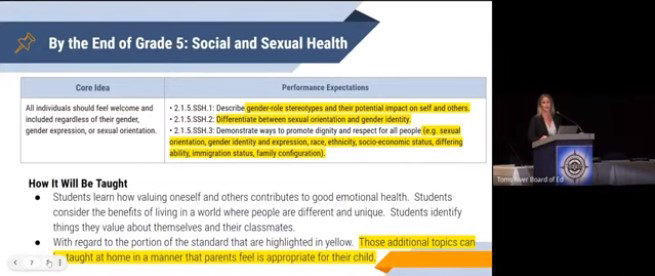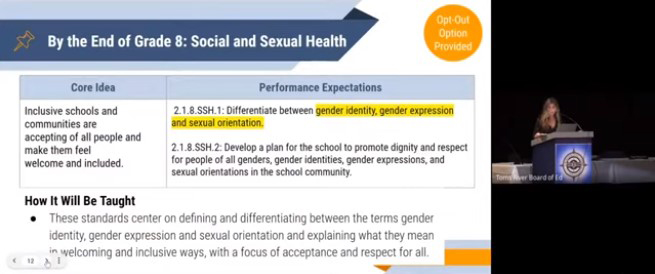
TOMS RIVER – The state’s new guidelines for sex education have been a big talking point for months, and discussions of it took place during three Board of Education meetings over the course of one week before finally being approved unanimously.
The state’s Comprehensive Health and Physical Education guidelines are 66 pages long, and actually contain very little about sex ed. However, some expressed concern about things like anal and oral sex being mentioned – although districts had control over how little detail they would include.
Politicians attacked the guidelines, asserting that introducing gay fictional characters or information about real LGBTQ+ people in history to children at a young age would turn children gay. Parents said these are conversations that belonged in the home.
The state’s guidelines can be found here: nj.gov/education/cccs/2020/2020%20NJSLS-CHPE.pdf
The first recent meeting where it came up was during a committee meeting on August 10. During committee meetings, the board and officials give reports on topics like “Curriculum” or “Buildings and Grounds.” There were fewer than 300 people who watched this meeting on YouTube, and there were zero comments.
When the topic came up, Superintendent Michael Citta said during this meeting “We have a lot of people with a lot of different needs, and we can handle changes. Not every kid learns the same” and lessons aren’t appropriate for every child. It is possible to provide alternative assignments if parents were uncomfortable.
“We all love our kids. Sometimes, that support is in open dialogue and trust in spite of what the national rhetoric is. We refuse to let it become political. We don’t indoctrinate, we educate,” he said. It’s all backed up with communication and being a good role model.
“Curriculum doesn’t educate; teachers do,” Board member Anna Polozzo said.
Board member Lisa Contessa said that students are sent home packets about what they learn, and there are also back to school nights. Parents should look into what their children are learning and ask any questions they have.
The state standards have often been referred to as a guideline because each district has the control to make these changes in their own way.
The public had a chance to talk about these changes at a hearing on August 15. No actions were scheduled for the board to take, this was just a time to listen. There were 1,200 people who watched this meeting and there were a number of comments.
Curriculum officials opened by giving a brief overview of the changes.

Rachel Cicala, Director of Elementary Curriculum, noted that parents and guardians are the primary educators. If there are any lessons they don’t want their kids to hear, the child will be moved to another classroom for alternate lessons.
Elementary students will learn about gender roles and stereotypes, but in an age-appropriate way, she said. Children will talk about the things they like to do and wear, for example. The goal is to let students feel welcome and included regardless of their identity.
Adrienne Gold, Director of Secondary Curriculum, said that sexual acts are not defined, but body parts are named as a way for infections to enter your body.
When it comes to what students need to know before graduating, those standards haven’t really changed from the way it’s been taught for the last few years.
Some parents spoke out against the curriculum changes, and urged the board and the officials to stand up to the state.
Some parents said these changes are for the better – or that they are really not that different than what they had in school.
Samantha Hanson, a project manager for Garden State Equality, an LGBTQ+ advocacy group, lives in Silverton. She explained that an inclusive curriculum results in a better environment for all students and that there has been a lot of misrepresentation in social media about the curriculum.
She listed statistics about how many LGBT individuals reported that they had made suicide plans back when they were in school because of their treatment.
“Kindness and acceptance is something we should all be for,” she said.
At the next regular Board of Education meeting, which was August 17, residents Joseph and Lyzzette Steffer said that the people coming from Garden State Equality or from other towns were fake and insulting to them.
At that meeting, Board member Kathleen Eagan said “Our curriculum is strong and it is more than just the standards for health and physical education that the state has pushed at us.”
Board members Kevin Kidney and Ashley Lamb suggested talking to your child’s teacher.
Polozzo said the district is required to do include the curriculum by law. When board members are sworn in, they swear to uphold the law. She encouraged parents who are uncomfortable with this portion to opt out.
There were fewer than 300 people who watched the August 17 Board of Education meeting, and there were three comments.

It was during this meeting that the board voted unanimously to approve the curriculum.
“When a curricular document is up for revision, it is presented at the Curriculum Committee meeting of the whole,” a school spokesman said. “Each August we re-approve all K-12 curricular documents as the summer is an ideal time for revisions, especially for mandates that are up for implementation in September. If an item is drawn out in discussion, as the K-12 Comprehensive Health & PE curriculum was, it is discussed at length (and, in rare instances, presented in a public forum for feedback) and then gets approved at the next board meeting as part of the committee workshop meeting agendas. If a board member (or multiple) chooses to vote ‘No’ on an individual curriculum, it would be pulled out and not approved as part of the general documents approval. This was not the case in Toms River.”
More than a dozen districts throughout the state have refused to implement the changes, resulting in threats of less state aid and suspension of professional licenses.





